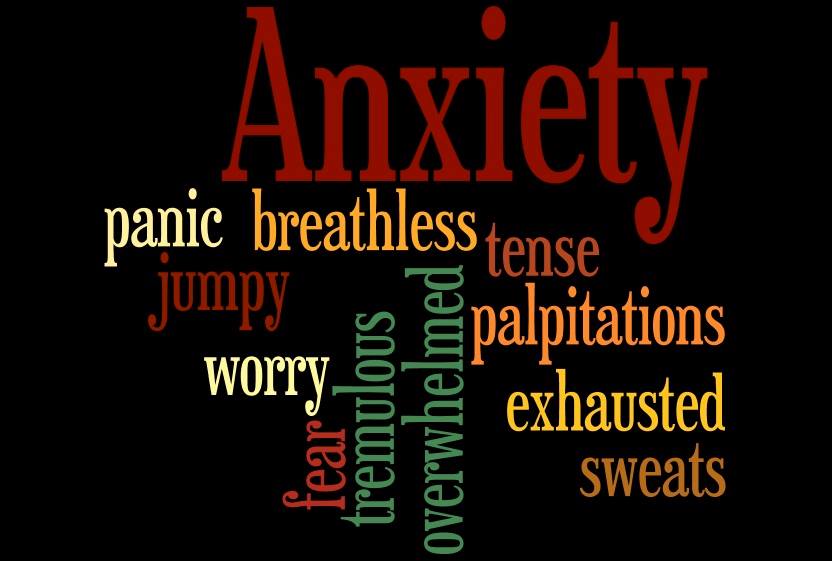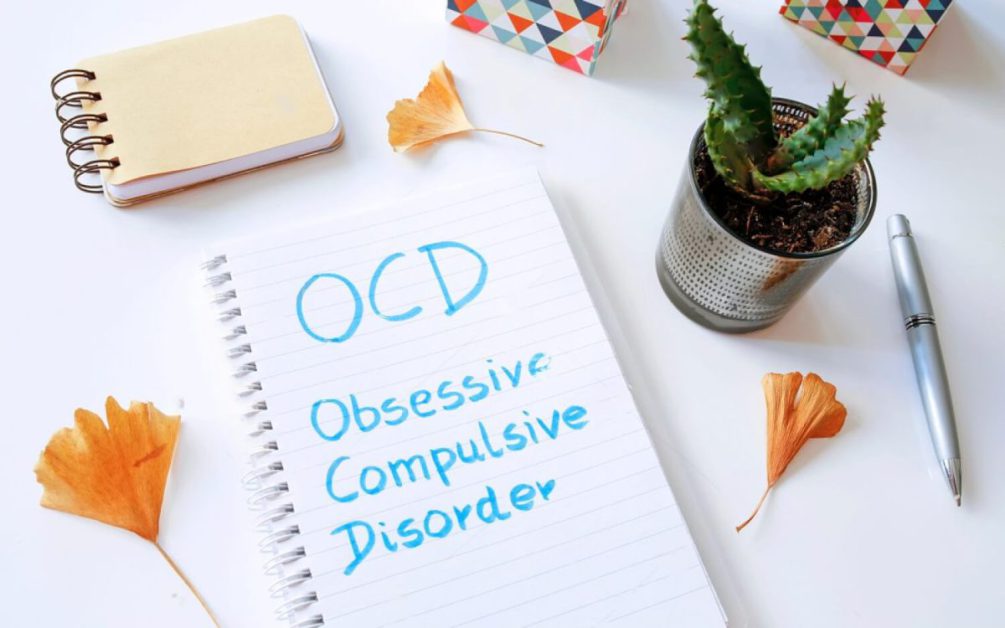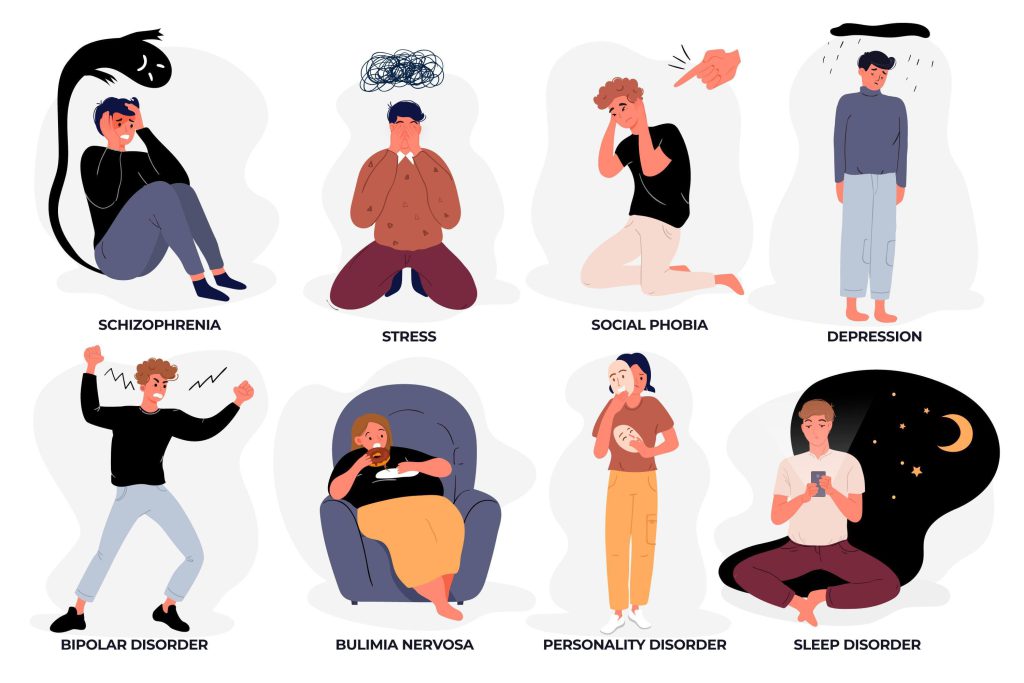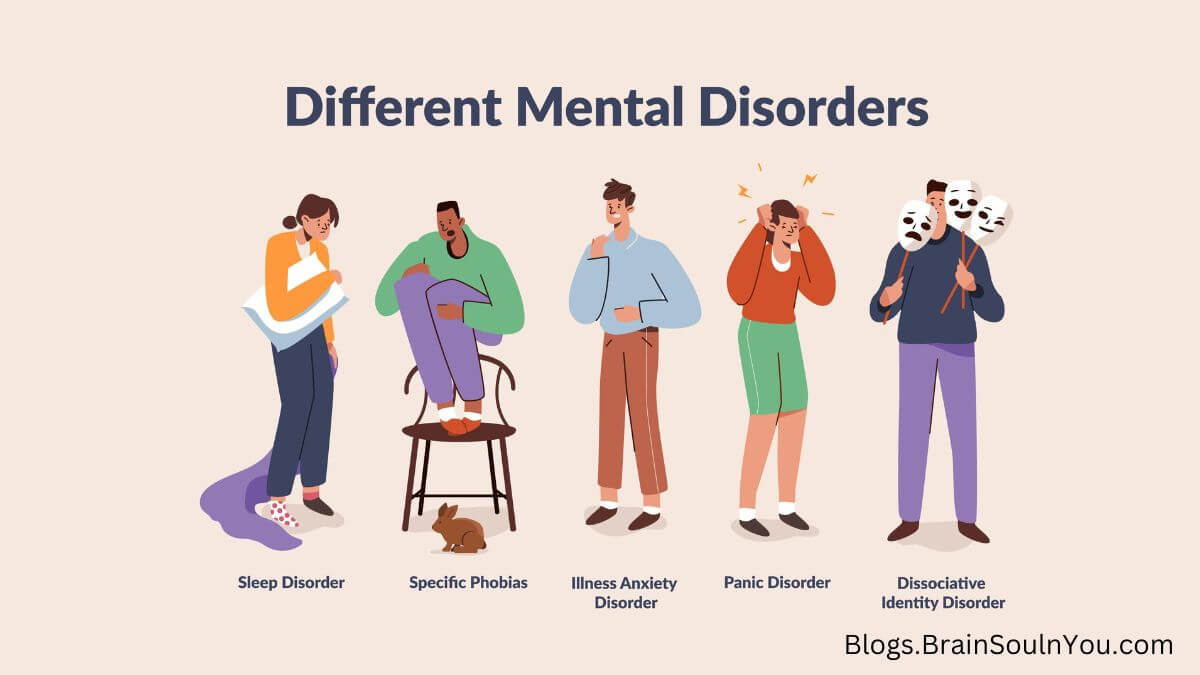Some common mental health terms are used to describe the most common mental disorders.
Mental disorders, also referred to as different types of mental health issues mental illnesses, or psychiatric disorders, are condition that affects a person’s thinking, behavior, emotions, or overall mental well-being.
Mental disorders are characterized by a range of symptoms that cause significant distress and impairment in functioning. These conditions can impact various aspects of a person’s life, including their relationships, work or school performance, and daily activities.
Different Types of Mental Disorders
There are numerous types of mental disorders, each with its own set of symptoms and diagnostic criteria. Some common examples include depression, anxiety disorders, bipolar disorder, schizophrenia, obsessive-compulsive disorder (OCD), post-traumatic stress disorder (PTSD), eating disorders, and attention-deficit/hyperactivity disorder (ADHD).
Mental disorders can have various causes, including genetic factors, chemical imbalances in the brain, environmental influences, traumatic experiences, or a combination of these factors. They are not simply a result of personal weakness, character flaws, or a lack of willpower.
Here are some different types of mental disorders:
1. Anxiety
A feeling of unease, such as worry or fear, is often accompanied by physical symptoms like a rapid heartbeat or difficulty concentrating. Anxiety disorders are persistent and can interfere with daily life.

Anxiety is a common and normal human experience characterized by feelings of worry, fear, or unease. However, when anxiety becomes persistent, overwhelming, and interferes with daily life, it may be indicative of an anxiety disorder. Here are some key points to understand about anxiety:
Symptoms
Physical symptoms may include rapid heartbeat, sweating, shortness of breath, muscle tension, and restlessness. Emotionally, anxiety may lead to excessive worry, irritability, difficulty concentrating, and feeling on edge. Behavioral symptoms can include avoiding certain situations or places due to fear or excessive reassurance-seeking behaviors.
Types of anxiety disorders
There are several types of anxiety disorders:
- Generalized Anxiety Disorder (GAD)
- Panic disorder
- Social anxiety disorder
- Specific phobias, and others.
Each type has its own specific symptoms and diagnostic criteria.
Causes
Anxiety disorders can be influenced by a combination of genetic, environmental, and psychological factors. Traumatic experiences, chronic stress, a family history of anxiety disorders, and imbalances in brain chemistry are some potential contributors. Sometimes, anxiety can arise without a specific cause or trigger.
Treatment Options
Anxiety disorders are treatable, and various treatment approaches are available. The most common treatments include psychotherapy (such as cognitive-behavioral therapy), medication (like selective serotonin reuptake inhibitors), and self-help strategies. A combination of therapy and medication may be used in more severe cases.
Self-help Strategies
Managing anxiety can involve self-care practices such as regular exercise, maintaining a balanced diet, getting sufficient sleep, practicing relaxation techniques (such as deep breathing or meditation), and engaging in activities that bring joy and reduce stress. Avoiding excessive caffeine and alcohol consumption can also be helpful.
Seeking Professional Help
If anxiety symptoms significantly interfere with your daily life, it’s important to seek professional help. A mental health professional, such as a psychologist or psychiatrist, can provide an accurate diagnosis, develop an appropriate treatment plan, and offer support and guidance.
Remember, everyone’s experience with anxiety is unique, and it’s essential to prioritize your mental well-being.
2. Depression
A mood disorder characterized by persistent feelings of sadness, loss of interest or pleasure, and a lack of energy or motivation. It can affect thoughts, feelings, behavior, and physical well-being.

Depression is a mental health disorder characterized by feelings of persistent sadness, lack of interest, lack of pleasure in activities, and hopelessness. It is a common condition that can affect anyone regardless of gender, background, or age. Depression can have a significant impact on a person’s feelings, thoughts, behavior, and overall well-being.
Here are some key points about depression:
Symptoms
Some common symptoms of depression are:
- Persistent sadness
- Feelings of emptiness or irritability
- Loss of interest in activities
- Changes in appetite and sleep patterns
- Fatigue
- Difficulty concentrating
- Feelings of worthlessness or guilt
- Includes thoughts of death or dying or suicide
Causes
The exact cause of depression is not known, but it is believed to result from a combination of genetic, biological, environmental, and psychological factors. Some potential triggers include a family history of depression, significant life changes, chronic illness, trauma, or certain medications.
Types of Depression
There are different types of depression:
- Major Depressive Disorder
- Persistent Depressive Disorder (Dysthymia)
- Seasonal Affective Disorder (SAD)
- Postpartum Depression.
Treatment
Common approaches include psychotherapy (such as cognitive-behavioral therapy or interpersonal therapy), medication (such as antidepressants), or a combination of both. Lifestyle changes, such as regular exercise, a balanced diet, adequate sleep, and stress management techniques may also be beneficial.
Seeking Help
If you or someone you know is experiencing symptoms of depression, it is essential to seek help from a healthcare professional, such as a doctor or mental health therapist. They can provide an accurate diagnosis, develop an individualized treatment plan, and offer support throughout the recovery process. It is important to remember that seeking help is a sign of strength and that effective treatments are available.
Support
Support from loved ones plays a crucial role in the recovery process. Friends and family members can offer emotional support, understanding, and encouragement. Support groups or online communities can also provide a sense of belonging and connection with others who are experiencing similar challenges.
If you or someone you know is in crisis or experiencing thoughts of self-harm or suicide, it is important to seek immediate help. Contact emergency services or a helpline in your country to ensure safety and receive the appropriate support.
Remember, depression is a treatable condition, and with the right support and treatment, individuals can experience improvement in their symptoms and quality of life.
3. Schizophrenia
A chronic mental disorder that affects a person’s perception of reality, thinking, emotions, and behavior. Symptoms may include hallucinations, delusions, disorganized speech, and impaired cognitive functioning.

Schizophrenia is a long-term and severe mental disorder that affects the way a person thinks, feels, and behaves. It is characterized by a range of symptoms that can significantly affect a person’s perception of reality and their ability to function in daily life. Schizophrenia is relatively rare, affecting approximately 1% of the population worldwide.
Here are some key points about schizophrenia:
Symptoms
There are 3 types of symptoms of schizophrenia: Positive symptoms, Negative symptoms, and cognitive symptoms.
- Positive symptoms include hallucinations (seeing or hearing things that are not there), delusions (holding false beliefs), disorganized thinking and speech, and abnormal behaviors.
- Negative symptoms refer to a loss of normal functions and can include reduced motivation, decreased emotional expression, social withdrawal, and difficulty experiencing pleasure.
- Cognitive symptoms involve problems with attention, memory, and executive functioning.
Causes
The exact cause of schizophrenia is unknown, but research suggests that a combination of genetic, environmental, and neurobiological factors contribute to its development. Genetic predisposition, imbalances in brain chemicals (neurotransmitters), brain structure abnormalities, and environmental factors such as exposure to viruses or certain stressors during pregnancy or early life may all play a role.
Treatment
Treatment of schizophrenia usually involves a combination of medication, psychosocial support, and psychotherapy.
- Antipsychotic drugs help manage symptoms by targeting neurotransmitter imbalances in the brain.
- Psychosocial support, including education, vocational training, and community services, can aid individuals in their recovery and enhance their quality of life.
- Psychotherapy, such as cognitive-behavioral therapy (CBT) or family therapy, can help individuals cope with the challenges of the illness and improve their functioning.
Support
Support from family, friends, and mental health professionals is crucial for individuals with schizophrenia. Supportive environments, understanding, and open communication can help reduce stigma and facilitate recovery. Support groups and community resources can also provide valuable information, encouragement, and a sense of belonging.
If you suspect that you or someone you know may have symptoms of schizophrenia, it is essential to seek a comprehensive evaluation and diagnosis from a mental health professional. Early intervention and treatment can lead to better outcomes and improved quality of life for individuals living with schizophrenia.
4. Obsessive-Compulsive Disorder (OCD)
A mental health disorder characterized by recurrent unwanted thoughts (obsessions) and repetitive mental or behavioral acts (compulsions).

Obsessive-Compulsive Disorder (OCD) is a mental health condition characterized by recurrent, intrusive, and unwanted thoughts, images, or urges (obsessions) that lead to repetitive behaviors or mental acts (compulsions). OCD affects people of all ages and can significantly impact their daily functioning and quality of life.
Here are some key points about OCD:
Obsessions: Obsessions in OCD are persistent and intrusive thoughts, images, or urges that cause distress and anxiety. Common obsessions include fear of contamination or germs, doubts about safety or harm, unwanted taboo thoughts or aggressive impulses, excessive need for symmetry or order, and intrusive religious or sexual thoughts.
Compulsions: Compulsions are repetitive mental or behavioral acts that individuals with OCD feel compelled to perform in response to their obsessions. The purpose of compulsions is to reduce anxiety or prevent a feared event. Examples of compulsions include excessive handwashing or cleaning, checking behaviors (such as checking locks or appliances repeatedly), counting or repeating rituals, mental reviewing or praying, and arranging or organizing objects in a specific way.
Impact on Functioning: OCD can significantly interfere with a person’s daily life, relationships, and occupational functioning. The time-consuming nature of compulsions can lead to difficulties in completing tasks, work-related problems, and social isolation. The distress caused by obsessions and the need to engage in compulsions can cause significant emotional and psychological strain.
Causes
There is evidence of abnormalities in brain structure and functioning, particularly in the areas related to decision-making, impulse control, and fear response. Traumatic events, chronic stress, and certain infections have also been implicated as potential triggers for OCD.
Treatment
OCD is a treatable condition, and several approaches can help manage its symptoms. The effective treatments for OCD are medication and cognitive-behavioral therapy (CBT).
- CBT, specifically a type called exposure and response prevention (ERP), helps individuals confront their fears and resist engaging in compulsive behaviors.
- Selective serotonin reuptake inhibitors (SSRIs) are commonly prescribed medications for OCD, as they can help reduce anxiety and control obsessions and compulsions.
Support and Self-Care
Support from mental health professionals, family, and friends is crucial for individuals with OCD. It is essential to create a supportive and understanding environment that promotes open communication and reduces stigma. Engaging in self-care practices, such as stress management techniques, regular exercise, maintaining a healthy lifestyle, and seeking support through support groups or online communities, can also be beneficial.
If you or someone you know is experiencing symptoms of OCD, it is important to seek help from a mental health professional for an accurate diagnosis and appropriate treatment. Early intervention and ongoing management can help individuals with OCD effectively manage their symptoms and improve their overall well-being.
5. Eating Disorders
A group of mental health disorders characterized by abnormal eating behaviors and distorted body image. Eating disorders can affect both physical and psychological health and require professional treatment.

Some eating disorders are anorexia nervosa, bulimia nervosa, and binge eating disorder.
Anorexia Nervosa: Anorexia nervosa is characterized by an intense fear of gaining weight, a distorted body image, and severe restrictions in food intake. People with anorexia may engage in extreme dieting, and excessive exercise, and may have a distorted perception of their body size and shape, leading to significant weight loss and malnutrition.
Bulimia Nervosa: Bulimia nervosa involves repeated episodes of excessive eating followed by compensatory behaviors such as self-induced vomiting, excessive exercise, or the use of laxatives or diuretics.
Binge Eating Disorder: Binge eating disorder is characterized by recurrent episodes of uncontrollable overeating, during which individuals consume large amounts of food in a short period and feel a loss of control. Unlike bulimia, there are no compensatory behaviors such as purging, fasting, or excessive exercise.
Other Specified Feeding or Eating Disorders (OSFED): OSFED includes eating disorder symptoms that do not meet the full criteria for anorexia, bulimia, or binge eating disorder but still cause significant distress and impairment. Examples include atypical anorexia nervosa (where weight is not below normal), purging disorder (engaging in purging behaviors without binge eating), and night eating syndrome (consuming a significant amount of food after waking up during the night).
Causes
Eating disorders are complex conditions with multiple factors contributing to their development. Biological, psychological, and sociocultural factors can all play a role. Genetic predisposition, neurobiological factors, low self-esteem, perfectionism, societal pressures, trauma, and family or interpersonal dynamics can contribute to the development of eating disorders.
Treatment
Treatment for eating disorders typically involves a multidisciplinary approach, including medical, nutritional, and psychological interventions. The goals of treatment include restoring a healthy relationship with food, addressing underlying emotional and psychological issues, and improving overall well-being. Treatment may involve individual therapy, family therapy, group therapy, nutritional counseling, and in some cases, medication.
Recovery and Support
Recovery from an eating disorder is possible with proper treatment and support. It is essential to seek professional help early, as early intervention leads to better results. Support from mental health professionals, family, and friends is important in the recovery process.
Mental Health Terms for Mental Disorders Treatment

Cognitive-Behavioral Therapy (CBT): A type of psychotherapy that focuses on identifying and changing unhelpful thoughts, beliefs, and behaviors. It is an evidence-based treatment for various mental health conditions.
Medication: Prescription drugs are used to manage and alleviate symptoms of mental health disorders. Medication can be an important component of treatment when prescribed and monitored by a healthcare professional.
Therapist: A licensed mental health professional who provides counseling, therapy, and support to individuals experiencing mental health challenges. Therapists can have various backgrounds, including psychologists, social workers, counselors, and psychiatrists.
Support Group: A gathering of individuals who share similar experiences or challenges, providing mutual support, understanding, and a safe space to discuss their struggles and successes.

Coping Strategies: Techniques and behaviors used to manage stress, emotions, or difficult situations.
Therapy: A form of treatment that involves talking with a mental health professional to address emotional or psychological challenges.
Psychiatrist: A medical doctor specializing in the diagnosis, treatment, and management of mental health disorders, including prescribing medications.
Psychologist: A mental health professional trained in providing therapy, assessments, and counseling.
Counselor: A professional trained to provide counseling and support for emotional and mental health issues.
It’s important to note that this list is not exhaustive, and there are many more terms related to mental health. Each term represents a complex aspect of mental health, and seeking professional guidance is recommended for a comprehensive understanding and accurate diagnosis.
Read blogs on other mental disorders: 10 Mental Disorders – Mental Health Terms | Part – 2
Read more blogs on Depression Treatment, 5 Most Powerful NLP Techniques, Mental Health – Stress and Mental illness, The Benefits of Yoga | Yoga Benefits for Mental Health, How to Help Someone with Anxiety War or Anxiety Disorder
Love,
Saurabh Goel
Saurabh Goel
Meet the transformative force behind ‘Brain Soul & You’—Founder and CEO, a dynamic NLP Wellness Coach, Life Coach, and Brain Analyst. With a B.Tech in IT, he shifted gears to empower lives through counseling and training. For over 7 years, his motivational presentations on entrepreneurship and mind programming have inspired audiences, marking him as a catalyst for positive change.


